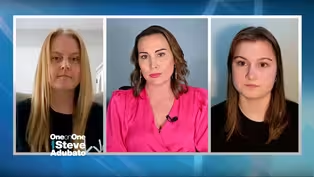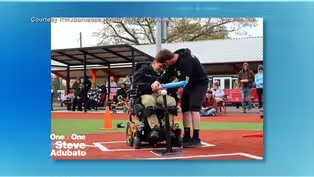One-on-One
CEO of Provident Bank addresses new challenges in banking
Clip: Season 2025 Episode 2777 | 9m 17sVideo has Closed Captions
CEO of Provident Bank addresses new challenges in banking
Steve Adubato sits down with Anthony Labozzetta, President & CEO of Provident Bank, to discuss critical issues within the banking industry such as affordability for consumers and the integration of new banking technology.
Problems playing video? | Closed Captioning Feedback
Problems playing video? | Closed Captioning Feedback
One-on-One is a local public television program presented by NJ PBS
One-on-One
CEO of Provident Bank addresses new challenges in banking
Clip: Season 2025 Episode 2777 | 9m 17sVideo has Closed Captions
Steve Adubato sits down with Anthony Labozzetta, President & CEO of Provident Bank, to discuss critical issues within the banking industry such as affordability for consumers and the integration of new banking technology.
Problems playing video? | Closed Captioning Feedback
How to Watch One-on-One
One-on-One is available to stream on pbs.org and the free PBS App, available on iPhone, Apple TV, Android TV, Android smartphones, Amazon Fire TV, Amazon Fire Tablet, Roku, Samsung Smart TV, and Vizio.
Providing Support for PBS.org
Learn Moreabout PBS online sponsorship(upbeat music) - Hi, everyone, Steve Adubato, we kick off the program with Tony Labozzetta, who is in fact the President and CEO of Provident Bank, the oldest bank in New Jersey, the second-largest bank in the state in terms of asset size, Tony, good to see you again.
- Great to see you, Steve.
Pleasure to be back.
- You got it, the footprint of Provident today is...
Describe it, please.
- Wow, you know, I would say one of the most trusted, oldest banks in the state, where being focused entirely on the customer's journey, we're so customer-centric, employee-centric, community-centric, I think that experience really is what defines us as a regional bank, community bank in our space.
- But the geographic footprint, if you will, where?
- The geographic footprint, we are predominantly northern...
Most of New Jersey, Eastern Pennsylvania, we have locations in New York, on Long Island, specifically in Astoria, Queens.
- Tony, let's talk about this historic merger between Provident Bank and Lakeland Bank, successful... Officially successful, the government signed off on it in May of 2024.
A, why the merger?
B, the impact on customers, please, Tony.
- Sure, I would argue that... Not argue, I would state that the merger is compelling from every stakeholder's perspective.
When you look at it from a customer, which is obviously the communities and customers, the scale that we produce of being at approximately 25 million and the synergies we create allows us to redirect some of those dollars into investments, into better technologies, to be able to provide digital solutions for our customers to access the bank in any way they choose, so...
Allowing us to have better data capabilities.
From our shareholders having the efficiency, having a bank that can continue to grow and have a successful and a potentially prosperous future, I think is really important.
From our employees and talent, we're able to bring together the best teams from the combined bank, access to new talent in the marketplace that would allow us to continue to grow and be very stable, and very prosperous as we move forward, and it'll give us greater resources through our foundation and the bank to be able to aid the community better through our charitable giving and our volunteers.
- For some who were critical of the merger, who said, you know, it's gonna create these "banking deserts," if you will, where communities won't have a bank, talk directly to that.
- I certainly don't subscribe to that, you know, when you look at our institution, you know, clearly, there's 22 branches that closed as a byproduct of this merger, but I would say, predominantly, most of 'em were within a mile or so of the existing location, right?
So banks today have to optimize their channels, I mean, so we're not in the mode of reducing branches, we're in the mode of optimizing, that means being able to give access to more customers, you might see us open a branch in a different location, but we're... We basically consolidated those that were so close in proximity to one another, that they made no impact to the customer, except the fact that they're going from one location to the one potentially across the street.
- Tony, you talk... You've been talking a lot about access, and that people want to access their bank and deal with their bank in different ways, to what degree has technology impacted what you just described?
- It's immense, and I think that, you know...
I'm not sure if the average individual sees that, but in a modern era of banking, you...
When you walk into a branch these days, the activity levels, albeit there's some outliers, the activity levels are very, very small relative to the history where people used to line up, more of customers, especially the younger generations, but even the older generations have embraced this, they're using mobile banking.
The phone... Smartphones are probably the most used vehicle today in our banking, so having the right digital platforms, having ways where customers can seamlessly, without friction, use your product suite, I think is critical.
Having branches available for those that wish to make... To come in at any time, you don't have to set appointments with us, you just walk in and talk to some of our great service staff, you're able to do that, so it's really a hybrid world we live in, but I will tell you that, from pure percentage points, it's a...
Dominant activity is happening through the digital channels.
- Let me try this, because government policy impacts so many aspects of our life, but government policy clearly impacts the banking world, so as we do this program, we always put the date up, as to when we're taping, we're taping toward the back end of October 2024.
The Federal Reserve, the Fed, interest rates.
How much does that impact not only the banking world, but your customers and their ability to purchase houses, purchase cars, and borrow money to do those things?
Tony, please.
- Well, so it's a huge impact, but it also...
It starts with why rates rise and fall, right?
So when we saw the rapid rise of rates, it was a byproduct of what was happening...
Inflationary cycles that happened in our economy, so that... You know, the effects of the rising rates is like putting an anchor or brakes on the economy, right?
Consumer spending, business spending, reduces access to credit, is diminished, capacity for projects to cash flow are not there, so a lot of liquidity sits on the sidelines, and we don't see those robust investments that you see when we're in this potential cycle now of rates coming down.
It also impacts the consumer largely because if they have credit card debt, you know, the... Obviously, the movement of Fed rates usually is tied with a prime or SOFR that credit cards and home equity loans are usually more attached to, so it becomes more expensive for the consumer when we see the rates go the other way, obviously, the cost of servicing that debt declines, so it's better for the consumer, and you might also have... You might spur some activity...
Deeper activity in business to invest more, which is obviously wonderful for our economy and growth.
- Tony, one more on technology, AI and banking.
Worry you?
Concern you?
Excite you?
What?
- All the above.
(Steve laughing) I mean, I think AI is here, and we too, as an institution, are looking at how we make AI a part of our business processes, a lot... As many institutions, not just us, we have a lot of vendors that we operate through, and our vendors are also using some of that AI in their business processes, I think AI is gonna present a challenge for us in terms of what you may see in the fraud space and the hyper-activities, and some of that area, but in that same vein, we may be able to use AI as a tool to help fight that fraud, or or activity in that sector.
- What's the partnership with the New York Yankee Radio Network?
- I think the partnership... You know, we sponsored the broadcast booth and I think we chose the Yankees because of, you know, the same culture, longevity, winning attitudes, you know, constantly seeking to win, and perfection, and I think some of the things defined, you know, we saw it in ourselves, I mean, we're not saying we're the Yankees, but we admire their culture, and I think that's why we chose to be partners with them in the broadcast booth.
- Tony Labozzetta is President and CEO of Provident Bank, Tony, I thank you so much for joining us, we appreciate it.
- Always happy Steve, pleasure to be here.
- You got it.
Stay with us, we'll be right back.
- [Narrator] One-On-One with Steve Adubato is a production of the Caucus Educational Corporation.
Celebrating 30 years in public broadcasting.
Funding has been provided by The Russell Berrie Foundation.
New Jersey Institute of Technology.
The Fidelco Group.
The North Ward Center.
Robert Wood Johnson Foundation.
New Jersey Sharing Network.
The New Jersey Economic Development Authority.
Johnson & Johnson.
And by The New Jersey Education Association.
Promotional support provided by NJ.Com.
And by NJBIZ.
- New Jersey Institute of Technology has supported New Jersey businesses since 1881, when it was founded as the Newark Technical School and through their partnership with the non-profit New Jersey Innovation Institute.
They're igniting innovation and delivering transformative products and services throughout the state.
Learn more at NJIT.edu and NJII.com.
Inclusive alternatives to theater for the Deaf community
Video has Closed Captions
Clip: S2025 Ep2777 | 10m 8s | Inclusive alternatives to theater for the Deaf community (10m 8s)
The success of "Field of Dreams" recreational complex
Video has Closed Captions
Clip: S2025 Ep2777 | 9m 8s | Highlighting the success of "Field of Dreams" recreational complex (9m 8s)
Providing Support for PBS.org
Learn Moreabout PBS online sponsorship
- News and Public Affairs

Top journalists deliver compelling original analysis of the hour's headlines.

- News and Public Affairs

FRONTLINE is investigative journalism that questions, explains and changes our world.












Support for PBS provided by:
One-on-One is a local public television program presented by NJ PBS

